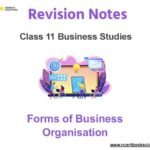Please refer to Bank Reconciliation Statement Class 11 Accountancy Exam Questions provided below. These questions and answers for Class 11 Accountancy have been designed based on the past trend of questions and important topics in your class 11 Accountancy books. You should go through all Class 11 Accountancy Important Questions provided by our teachers which will help you to get more marks in upcoming exams.
Class 11 Accountancy Exam Questions Bank Reconciliation Statement
Class 11 Accountancy er Science students should read and understand the important questions and answers provided below for Bank Reconciliation Statement which will help them to understand all important and difficult topics.
It is a statement prepared by the depositor (customer) for the purpose of making agree (reconcile) the cash book balance with the pass book balance on a certain date by making suitable adjustments.
Preparation of BRS – A bank reconciliation statement can be prepared in two ways:
1. Take the balance as per cash book as the starting point, adjust the effect of each item causing the differences and arrive at the balance as per pass book.

2. Take the balance as per pass book as the starting point, adjust the effect of each item causing the differences and arrive at the balance as per cash book.

Causes of differences between cash book balance and pass book balance
The differences between the cash book and the bank passbook are caused by:
• Timing differences on recording of the transactions.
• Errors made by the business or by the bank.
There are certain valid reasons for disagreement between the balances of cash book and pass book, they are as follows:
1. Cheque issued but not presented for payment – When a trader issues cheque to a third person, he immediately enters in the cash book whereas, it will be entered by the bank only when the cheques are presented to the bank for payment.
2. Cheque paid in but not credited by bank – Cheque received from customers might have been paid into bank and entered on the debit side of the cash book by the trader. But the bank will credit the same only after realization of the cheque.
3. Interest etc. credited by bank – Interest allowed on bank balance, dividends etc. collected by the bank will be credited in the pass book. But the trader may not enter the same in his cash book on the same day.
4. Bank charges etc. debited in pass book – Bank charges, interest on overdraft,
commission for collection of cheques, bills, etc. will be debited by the bank in pass book as and when they occure. But it will be entered by the trader only on a later date in his cash book as he may not be aware about them on the same day.
5. Cheques credited but dishonoured – When cheque is discounted, bank will credit it in pass book and customer debit it in cash book, hence both the balances will be increased. Later on if this cheque is dishonoured, the bank will debit the customers account (pass book) but it may not be entered by the trader in his cash book at that time.
6. Direct payment into the bank by trader’s customers – The customers of a trader might have deposited money into the trader’s bank account directly. But it may not be intimated to the trader soon, hence it will not be recorded in the cash book.
7. Payment made by bank on behalf of the customer – The bank might have made some payments on behalf of the customer under ‘standing instructions’ and debited the customer’s account. But the customer may not have entered the same in his cash book.
8. Dishonour of a bill discounted with the bank – Sometimes the customer discounts bills of exchange before maturity for urgent cash. If on the date of maturity, such a bill is dishonoured, the bank will debit the customer’s account. The customer will make this entry in his book only after getting information from the bank.
Items to be added with cash book balance
1. Cheques issued but not yet presented.
2. Interest allowed by the bank.
3. Interest, dividend, commission etc. collected by the bank but not recorded in the cash book.
4. Direct deposit made by the customer in firm’s bank account.
Items to be deducted from the cash book balance
1. Cheques deposited into bank but not yet collected.
2. Bank charges debited by the bank in the pass book.
3. Interest on overdraft charged by the bank.
4. Payment made by bank on customer’s behalf.
5. Cheques dishonored, but not recorded in cash book.
Note: If we are starting with the pass book balance, all the items added with cash book balance must be deducted and all the items deducted from the cash book balance must be added with the pass book balance.
In case the cash book and pass book shows an overdraft balance, the adjustment
should be made in opposite direction of starting with deposit balance.







